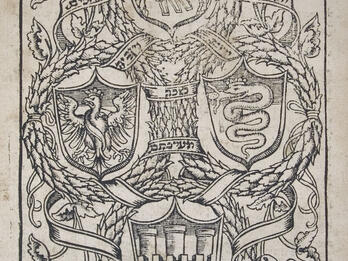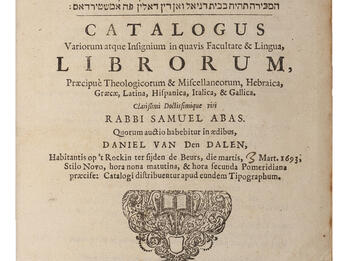Sifte yeshenim (Lips of the Sleepers): On Citing Authors
I am astonished to see that for reading just the names of the holy books, one receives his reward, as if he had read and studied them all. If so, then one will not make much of an effort to study books entirely; he will only learn their names. Regardless of this, he will receive his reward for reading the names: And it shall be, as with the people, so with the priest (Isaiah 24:2) and with the king. And who are the kings? Our rabbis [see b. Gittin 62a]. Moreover, if one is considered as though he had studied, then why doesn’t it just simply state that “this is counted for him as though he had studied”? What is the reason for the lengthy formulation, “it is beneficial for it to be considered, etc.”?
However, the matter is thus, as is said in the Gemara:
R. Yoḥanan got annoyed with R. Eliezar, since he came and reported a statement at the schoolhouse, but did not report it in the former’s name, etc. And it is said: Why did he get so annoyed? As R. Judah stated in the name of Rav: What is [the meaning of] the verse, I will dwell in Thy tent forever? (Psalms 61:5). Is it possible for a man to dwell in two worlds?! But this is in fact what David said to the Holy One, blessed be He: “Lord of the Universe, May it be Thy will that a traditional statement may be reported in my name in this world.” For R. Yoḥanan stated in the name of R. Simeon ben Yoḥai: The lips of a [deceased] scholar, in whose name a matter of halakhah is reported in this world, move in the grave [b. Yevamot 96b–97a].
Rashi interpreted this to mean that his lips move in the grave as though he were alive. In the Tosafot, it is written that when his soul is in the upper assembly and his lips are moving in the grave as though they were speaking, that is when he inhabits two worlds at once. The author of ‘En Ya‘akov and of Yefeh mar’eh wrote that this is illogical, “for how do the lips of the dead move, etc.? This is all the more so after time has passed and one’s body has returned to the dust, etc.”
I have found the following in the ḥidushe agadot of the Maharsha [Samuel Eidels]: “I say that this is not irrational, for it has been clarified that speech is a faculty of the soul that functions through the instrument of the body. All praiseworthy speech engenders a power of the soul that is similarly praiseworthy. When one says something in the name of the person who first said it, the spiritual power that was already engendered now awakens the one who engendered it in two worlds: the soul, in the world-to-come; and the instrument of speech, which is the lips, in this world, even when they are in the grave. And [the Gemara in Yevamot 97a] adduces the example of good wine that lies in a cellar, which moves because of the power of the finger that stimulates it. Thus are the lips. They too lie in the pit of the grave, and they move by way of the power [of the soul] that stimulates them.”
And now, consider the following: someone who, in this world, mentions [a deceased person] in his books is the cause that brings him [the deceased] to inhabit two worlds at once. That being so, it is fitting for the person who is mentioned to act for the sake of the one who mentions him, portion for portion, to advocate on his behalf; he should help and defend and save him, for the sake of the Honorable One who makes peace in the high places. For this reason, it is said that the reading of names—i.e., the same names mentioned in one’s books in this world—is beneficial, so that it is considered as if one has studied and learned. The souls of these same people advocate on his behalf. They help him, benefit him, and protect him, so that it is considered as though he had learned. Even without this, the Torah protects him, both when he busies himself with it and when he does not. Nevertheless, he certainly does not have a reward as great as if he had learned all of them. In any case, he has merit that he has awakened and has tried to have advocates and supporters for him. This is the reason that it is stated that it is “beneficial for it to be considered for him,” and not that he is truly “considered.” Rather, it is certainly only by way of one’s advocate and supporter.
In any case, even if he has advocates and supporters, regarding which matters do they advocate on his behalf? And how can an advocate help him in regard to judgment if he has not learned anything at all? Rather, the matter is thus: above, there are twelve gates of the supernal Garden of Eden, and the twelve tribes stand at the entry ways of the palaces. Each one calls to the members of its tribe, who depart from this world, if he is a righteous man, “Come to me! You come from me, and from my tribe.” When a man dies, his soul is given over to the angel Tahariel, and he leads the soul to the place that is suitable for it: to the angel called “Master of the Eyes,” or to the angel called “Master of the Ears,” or to the angel called “Master of the Neck,” etc. For in the supernal Garden of Eden, there is a “Master of the Bible,” and a “Master of the Mishnah,” etc. And if one is not worthy, then he is rejected from all of the gates.
Translated by
.
Credits
Shabbetai ben Joseph Bass (i.e. Shabbetai Meshorer Bass), “On Citing Authors (Hebrew),” in Sefer sifte Yeshenim (Lips of the Sleepers) (Amsterdam: David Tartas, 1680), approbations and introduction.
Published in: The Posen Library of Jewish Culture and Civilization, vol. 5.






